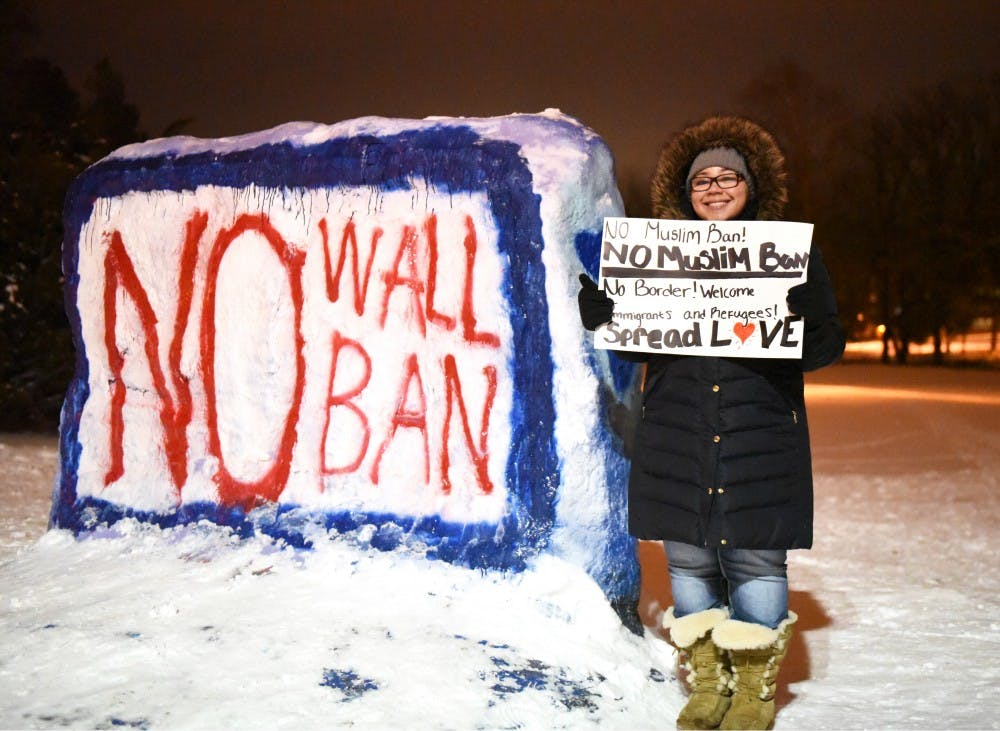Political science senior Maisie Rodriguez, an MSU Intercultural Aide and student activist who is Mexican-American, said President Donald Trump’s reference to Mexican immigrants as “rapists” in his first campaign speech was enough to permanently color her opinion of the businessman-turned-politician.
“When Donald Trump, back in 2015, he began to call Mexican men rapists, that’s when I knew this guy’s a racist," Rodriguez said. "So when he is calling my father a rapist, I knew exactly what he is saying when he is calling Muslims potential terrorists. No facts, no logic, no basis, it was plain racism.”
Rodriguez and sociology senior Alec Manaia were studying together and reading about Trump’s immigration ban when they brainstormed the idea to start a fundraiser in opposition to the policy.
“I said, 'OK, so, in order to study for this math exam, I have to tell myself I’m going to start a fundraiser, and then I can breathe,'" Rodriguez said. "'I need to help, and I feel very stuck right now.'”
Rodriguez quickly assembled a group of activists through posting in Facebook groups, and the group put together the “No Ban No Wall” T-shirt drive.
“There’s definitely a community of people on campus who are interested and concerned about these issues and interested in doing something about them,” Manaia said. “We have friends and a network here that we stay in touch with and work with on these things.”
Rodriguez said proceeds from sales of the $20 T-shirts reading “No Ban No Wall” in English, Somali, Spanish and Arabic go to the National Immigrant Justice Center, a Chicago-based organization that helps fund legal aid for immigrants and refugees. As of Tuesday morning, the group had sold 101 T-shirts, one more than their 100-shirt goal with fundraiser ending Tuesday.
The students involved in this fundraiser all have their own reasons for their activism against Trump’s executive order. Manaia said the current situation for Mexican and Muslim immigrants reminded him of the situation his great-grandparents faced when they immigrated to America from China in the 1920s. At the time, the Chinese Exclusion Act barred any Chinese citizens from immigrating to the U.S., so Manaia’s great-grandparents had to come to the U.S. as illegal immigrants. He described the struggles faced by his great-grandfather.
“Throughout his life, his illegal immigrant status — it excluded him from institutions in society, as well as his wife and other family members,” Manaia said. “It was something that caused fears and a feeling of not belonging in our family ... the things that he experienced as a part of that have become part of my mom and myself, too, especially in terms of being like, this isn’t our country, that we don’t belong here, that we have to be ashamed of our heritage.”
Elliott Strong, a 2016 MSU alumnus who said he did not often participate in organized activism during his time as a student in the James Madison College, decided to participate because of his personal experience working with refugees at a hotel that hired refugees from Middle Eastern countries including Somalia, Iraq and Afghanistan.
One of the women he met while at the hotel was a heart surgeon back in Iraq. The hospital she worked at was destroyed years ago, and upon coming to the U.S, she found she couldn't practice because her degree was not held to the same esteem as an American degree.
"Things like that had made it more personal for me, because I know these people," Strong said. "I know how stereotypes about refugees harm them, in not just even getting to the country, but even after once they’re here, all the struggles that they face because of their refugee status.”
Strong said the group had originally intended this fundraiser to benefit the ACLU, but that they are happy that it ended up benefiting a more localized group of lawyers.
“ACLU had $24 million donated over the weekend,” Strong said. “But those local groups, they’re doing a lot of local work that is important, that doesn’t necessarily make it to the national stage, and they’re not getting the support ACLU is getting. It’s nice to be able to help in that regard, too.”
Thanks to the help of some of the students Rodriguez found on Facebook, the fundraiser is supported by campus organizations including the Muslim Students' Association, the Somali Association of Michigan and No Lost Generation Initiative of MSU. Though the group that assembled for this project has no concrete plans to continue working together, Strong said working with campus groups and students has encouraged him to continue his activism.
“It’s actually been kind of inspiring and kind of encouraging to know that there are people that active and that committed to helping the world," Strong said. "Because post-election, I’ve been feeling a little down about our ability to change things, but interacting with people who are so involved with those groups and have that experience has made me more encouraged to try and fix things instead of sitting and hoping for the best."
Support student media!
Please consider donating to The State News and help fund the future of journalism.
Discussion
Share and discuss “Students start "No Ban No Wall" T-shirt fundraiser” on social media.







